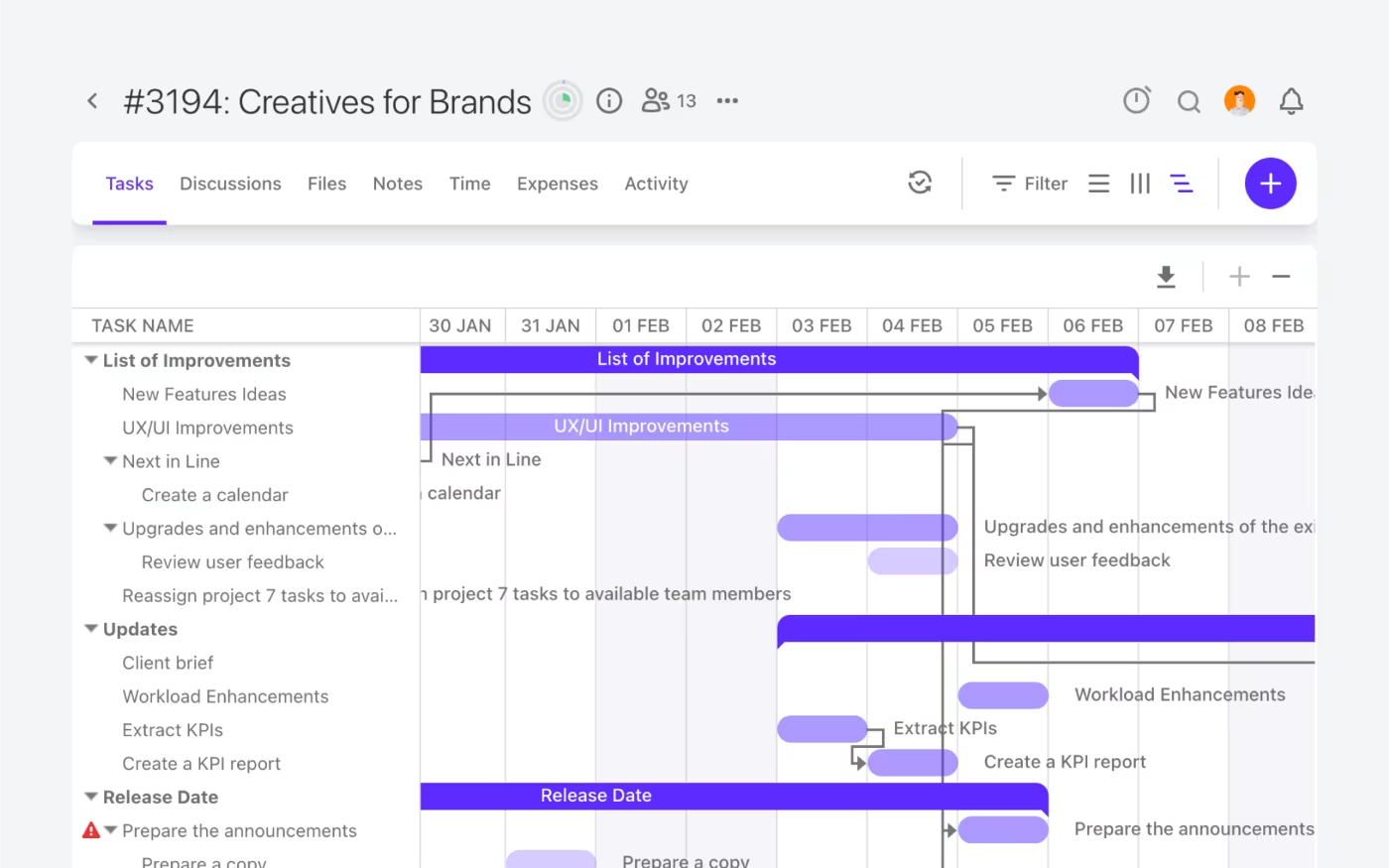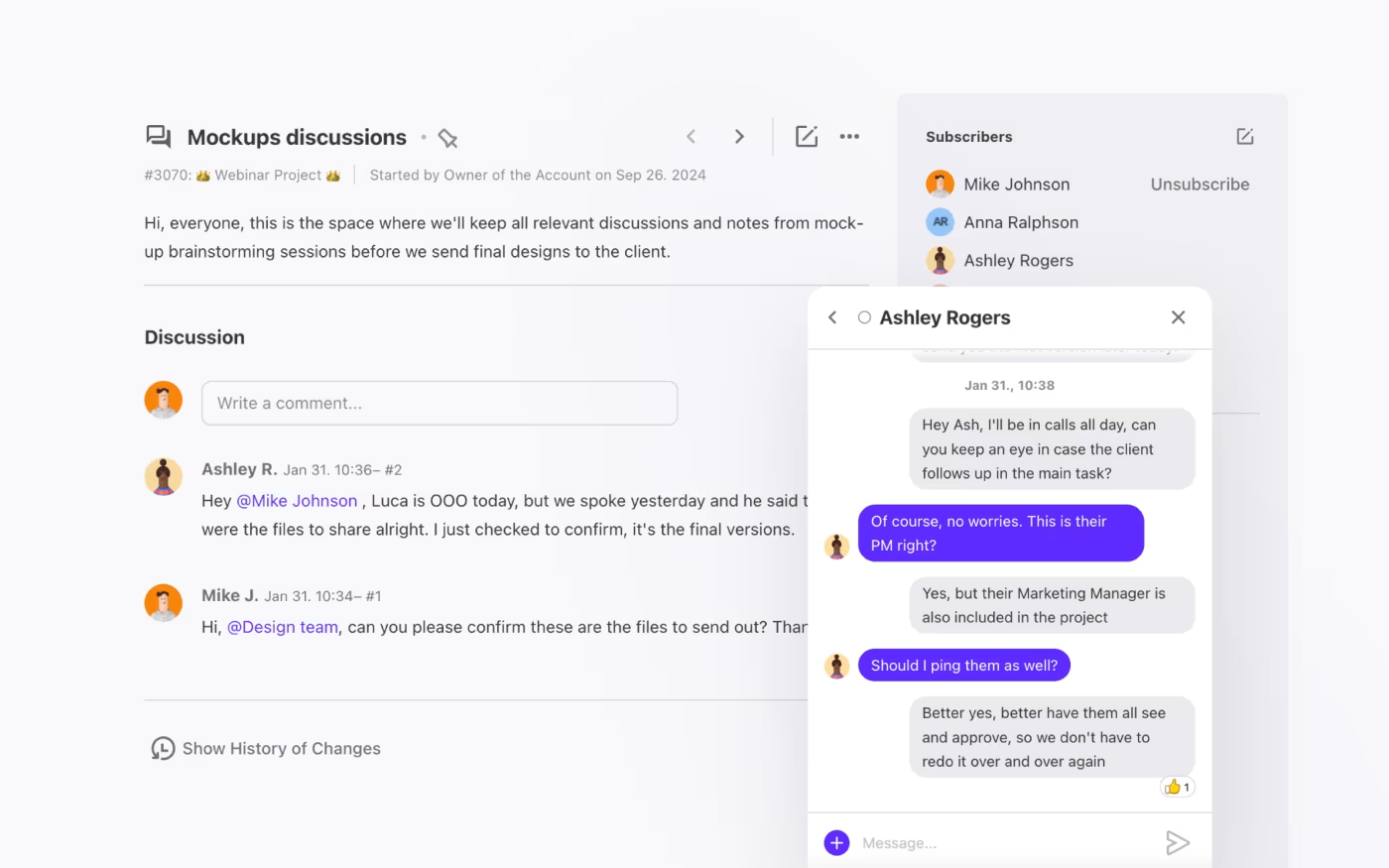If you’ve ever missed a task dependency in a project you’ve run, you know it cost you dearly. It may have thrown a spanner in the works of your entire schedule, pushed out your timelines, and led to some difficult client or stakeholder conversations.
Few things can mess up a project like missed dependencies. That’s why you need to get them right from the outset. Whether you’re building a website, launching a marketing campaign, or developing software, your schedule and deliverables literally depend on dependencies.
To give you a helping hand and help you prevent confusion and project failure, we break down everything you need to know about task dependencies. We tell you what they are, what types they come in, and how to identify and manage some key challenges like a pro.
What are task dependencies?
Task dependencies are links or relationships between project tasks in project management. They tell you which tasks or activities depend on one another to be completed successfully.
When you establish and identify task dependencies, you can then determine the order in which they need to be actioned and align your timelines accordingly.
For example, if you are building a website, before your team can write the copy and create visuals, you’ll need to have completed the following:
- Website brief – Purpose, requirements, goal ,and target audience
- Wireframes & UX design – Layout of sitemap and content structure
- UI Design – Style guide & branding
Only once you have all of that work done can you move on to creating actual content, whether it be copy or visuals.
So, content creation has multiple task dependencies that need to be finished before it can start.
What are the types of task dependencies?
In project management, task dependencies can be internal or external, and they come in four types.
Finish-to-Start (FS)
Finish-to-Start (FS) is are dependency where Task A must finish before Task B can start. These are tasks that are sequential and have no overlaps.
If Task A is delayed, Task B will be, too.
Finish-to-Start is the most common type of task dependencies, and they are used in a variety of project types in construction, software development, and design or marketing industries.
Start-to-Start (SS)
Start-to-Start (SS) is a dependency type where Task A must start in order for Task B to start. These tasks work in parallel, but Task A must start first.
Here again, if Task A has a delayed start, so will Task B. The only difference is that it doesn’t have to wait for Task A to finish.
Start-to-Start dependencies are useful when you need to condense timelines, and do so by overlapping as many tasks as you can. However, this might only be possible if you have enough resources to cover multiple tasks.
Finish-to-Finish (FF)
Finish-to-Finish (FF) dependencies are dependencies that need Task A to finish before Task B can be completed.
This means it’s OK for Task B to start earlier or even before Task A, as long as it doesn’t finish first.
Finish-to-Finish dependencies are not too common, but they are useful when different teams are working on one item that combines different elements, such as copy and visuals for one report.
Start-to-Finish (SF)
Start-to-finish dependencies are where Task B cannot finish until Task A starts. It sounds a bit confusing, but essentially, Task B must stay active until Task A starts.
Unlike other dependency types, for this one, the completion of Task B is delayed (not its start) if Task A is deferred.
These types of dependencies are not common and are only used in unique cases where transitions or continuous operations are in question. The most obvious example would be switching IT servers or relaunching a new website. The new server or website must be up and ready to go before you can shut down the old one.
How establishing dependencies improves project management
If you want to finish any project or client initiative on time, your (project) schedule needs to be spot on. You need to have a clear breakdown of deliverables, and you must factor in the relationships (task and project dependencies) that exist between all your activities.
There are three main ways clearly defined task dependencies help project managers lead and deliver work to the finish line.
Create accurate timelines
When you clearly establish all your dependencies, you can work out the most efficient and effective sequence and timeline for your project. Using a Gantt chart like the one ActiveCollab lets users create allows you to not only construct your project timeline, but also mark all the task dependencies you need to keep an eye on.

These timelines help keep everyone on track and guide them on the order of execution for each moving part.
Having a visual representation of your workflow also makes it easier to spot which dependent tasks can run in parallel, and which need to be Finish-to-Start activities.
Avoid bottlenecks
When you miss vital dependencies, chances are you’ll run into trouble midway through the project. This can bring everything to a halt, and it may delay more than one task, which can create chaos in the entire schedule.
Task dependencies can also highlight and uncover critical paths, which are the longest sequences of dependent tasks that a project’s success literally depends on.
When you know what your critical path is, you can come up with a contingency plan before you get into trouble.
Manage Expectations
Being clear about existing task dependencies in your project workflows also helps to manage the expectations of your stakeholders and team. When you know upfront that one task is linked to another, you won’t have people starting things at the wrong time or requesting deliverables before they are complete.
This also encourages collaboration and regular communication between dependent task owners, which can only improve the final output.
How to manage task dependencies effectively
So, how do you go about managing task dependencies effectively? We’ll take you through the entire process, step by step.
Step 1: List your tasks
First up is creating a list of all the tasks in your project or initiative. A good way to do this is to use a Work Breakdown Structure (WBS) where you break tasks down into individual, manageable pieces.
To avoid missing anything, it’s always a good idea to set up a brainstorming session with the project team and any cross-functional collaborators who will also be involved in the delivery.
This session also provides a good opportunity to discuss any handover requirements so there are no misunderstandings and project or schedule flow hiccups.

Step 2: Identify dependent tasks
Next, you need to identify all the task dependencies that exist within your project. Some of these will be internal, others external.
- Internal dependencies – These are natural links within full control of your team. The owners of internal tasks are always your team members.
- External dependencies – These a links with external providers of services you need to engage to complete tasks. You have less control over their delivery and timelines.
Step 3: Map dependencies in project management software
Once you have a clear overview of all your internal and external task dependencies, it’s time to map them all out in a task management tool.
Task dependencies need to be set up in parent-child relationships. This establishes the correct sequence in which tasks need to be scheduled. The logic behind this concept is that a parent task cannot be completed until all the child tasks are finished.
ActiveCollab lets you set up parent-child task dependencies in a couple of ways.
Gantt chart or timeline view
The Gantt chart or timeline view gives you a visual presentation of your project timeline where you can set parent-child task dependencies in one click. You simply hover over your parent task, click and hold the circle that pops up, and drag to the child task. The line that shows up tells you that a task dependency has been set between the two tasks.
Within a task
You can also set a dependency within the task itself. To do that, simply open the task, click on the Add a Dependency button, choose if you want to add a Parent or Child task, and select the dependency from the displayed drop-down menu.
Step 4: Assign owners
When you have all your task dependencies clearly established and visible in your project timeline, your next step is to assign dependency owners.
Because task owners are closest to their task and track its progress daily, it makes sense to also make them the owners of the dependency. If delays do occur, they will be the first person to notice.
Even though the project lead is in charge of managing the schedule and final deliverables, it’s difficult for them to follow and have a full overview of each task dependency. That’s why it’s important to make task owners accountable for their tracking and smooth transition.
Step 5: Monitor progress & update stakeholders
The next step is to make sure dependent task owners monitor the progress of their tasks and update stakeholders if changes do occur.
If delays in child tasks do happen, it’s vital that the project manager and any dependent task owners are notified so they can evaluate if adjustments to the schedule need to be made.
Step 6: Collaborate to manage risks & delays
Finally, the last step is collaboration and risk management. Executing dependent tasks successfully takes effort and teamwork because you have more than one party involved and impacted if things don’t go to plan. This can result in budget and timeline blowouts and even project failure.
To avoid this, any bumps in the road, expected or existing issues, or delays need to be logged within each task in the project management tool. If you use ActiveCollab, which is also an integrated collaboration platform, all project team members who are subscribed to a project or task will receive notifications of all updates, so nobody is left out of the loop.

When you communicate issues early, you have a much better chance of managing risks and bringing in contingency plans to prevent catastrophic consequences.
Managing Key Task Dependency Challenges
Managing task dependencies can be overwhelming, especially for project managers who are just starting out. They can also be hard to identify if the project is a new initiative that is unlike any other you’ve done in the past.
Seasoned project managers have the benefit of past experience, which lets them identify and manage projects with multiple or complex dependencies more aptly. But if you’re relatively new, there are some things you can keep in mind to manage key challenges in this space.
Incorporate predecessor buffers
The most common challenge in task dependencies is managing delays due to predecessor tasks going over time. One way to avoid this issue is to include time buffers for predecessor or child tasks. That way, you leave room for late deliverables without impacting the parent task start and finish date, and your schedule stays intact.
Incorporate more than one dependency type.
Most projects rely heavily on the Finish-to-Start dependency type. But it’s not the only dependency you can use. When you identify dependencies, consider what type they can be. Where possible, use the Start-to-Start type because it lets you run tasks in parallel. This is especially useful if you have a tight timeline.
Do capacity planning to avoid resource constraints?
Another big cause of delays for dependent tasks is resource constraints. A child task may have been completed, but the resources you planned for the parent task might still be on another task or project. This issue can be avoided with accurate resource and capacity planning. This helps give you a clear overview of who in your team is available, for how long, and when.
Get advice from an SME.
Finally, if you’re struggling to identify and manage task dependencies, it’s always a good idea to bring in an expert. Speak to leaders or colleagues who have run similar projects in the past. Get their advice and invaluable insights from real-life scenarios that can be applied to your project.
Let ActiveCollab unscramble & simplify your task dependencies
Task dependencies do more than just make sure you get your tasks in the right order. They also help you spot which tasks you can run simultaneously, which can save time and money. However, identifying and managing dependencies can be a challenge for you and the team.
That’s where ActiveCollab comes in to save the day by unscrambling and simplifying task dependencies. As a project management platform with integrated collaboration and communication tools, it lets you not only manage the project from start to finish, but also set up and track task parent-child relationships.
The tool lets you plan your projects, create visual Gantt charts or timelines, assign task and dependency owners, and monitor progress.
By identifying and marking task dependencies in your ActiveCollab project, you can map out the most logical and efficient sequence of activities that prevent bottlenecks and keep everyone aligned and working in unison all the way to the finish line.
Need to get a better handle on your task dependencies? Get on to ActiveCollab. Sign up for our 14-day free trial or book a demo with one of our people. It’s a small investment for a whole lot of peace of mind.

